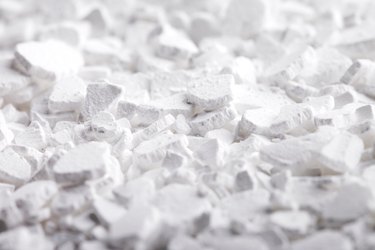Calcium chloride is a common substance used to preserve our food, melt ice on the road and even dry concrete. While calcium chloride can be harmful if handled improperly, it is a generally safe substance. No need to worry about the trace amounts in the food you eat. Just be sure to wear gloves when tossing it on your driveway and you should have no issues.
Video of the Day
Video of the Day
What Is Calcium Chloride Used For?
A white, crystalline substance, calcium chloride serves an array of purposes from food preservation to highway construction.
As far as food goes, calcium chloride is regarded as a safe preservative, commonly used as an anti-browning agent for fruits and vegetables, according to the FDA. The post-harvest application of calcium chloride keeps produce fresh by reducing the vegetables' weight loss, chilling injury, and loss of vitamin C and beta carotene, according to a 2016 article published in the Journal of Food Research. Calcium chloride is also used in products as a firming agent for foods like evaporated milk and cheese.
This substance is most commonly used to de-ice roads and highways in the form of road salt, according to the American Chemistry Council. Just like sodium chloride (table salt), calcium chloride lowers the melting temperature of ice and keeps our roads slip-free.
Calcium chloride is also often used as a concrete accelerator, according to the American Society of Concrete Contractors. The substance makes for an inexpensive and efficient way to speed up the rate at which concrete dries. However, there are certain restrictions in place that dictate the amount of calcium chloride permitted in concrete.
Common Health Risks Associated With Calcium Chloride
According to West Liberty University, there are some risks to consider while handling calcium chloride. The substance can cause burning of the skin and eyes if touched without proper gloves and handwashing. Long-term contact with calcium chloride can also lead to contact dermatitis, according to the International Programme on Chemical Safety (IPCS). If inhaled, calcium chloride can also cause irritation in the respiratory tract. If you experience irritation of the skin, eyes or respiratory tract, seek fresh air and wash the affected area.
Calcium chloride, while safe when ingested in doses applied to food, can be dangerous if consumed in larger quantities. Ingestion can cause nausea, vomiting or gastric distress. If a large amount of calcium chloride is consumed, drink several glasses of water or milk and seek medical attention as needed, according to the IPCS.
Read more: Why Does My Stomach Hurt After Eating?
How to Handle Calcium Chloride Safely
Calcium chloride can be safe to use if handled properly. According to West Liberty University, be sure to wear protective clothing that covers the skin, especially the skin that comes in direct contact with the substance. If you're working with calcium chloride for long periods of time, make sure you are in a well-ventilated area or take frequent breaks for fresh air.
When storing calcium chloride, keep it dry, concealed and away from zinc (since the two substances can react if mixed). If calcium chloride happens to spill, the IPCS recommends safely sweeping it into covered containers, moistening the salt if needed to more easily stow it.
- GRAS Notices
- Effect of Calcium Chloride and Hydrocooling on Postharvest Quality of Selected Vegetables
- Chlorine Compound of the Month: Calcium Chloride: Melting Ice in the Winter
- Acceptable Use of Calcium Chloride in Concrete
- MATERIAL SAFETY DATA SHEET CALCIUM CHLORIDE
- CALCIUM CHLORIDE (ANHYDROUS) ICSC: 1184
- Materials Safety Data Sheet: Calcium chloride
